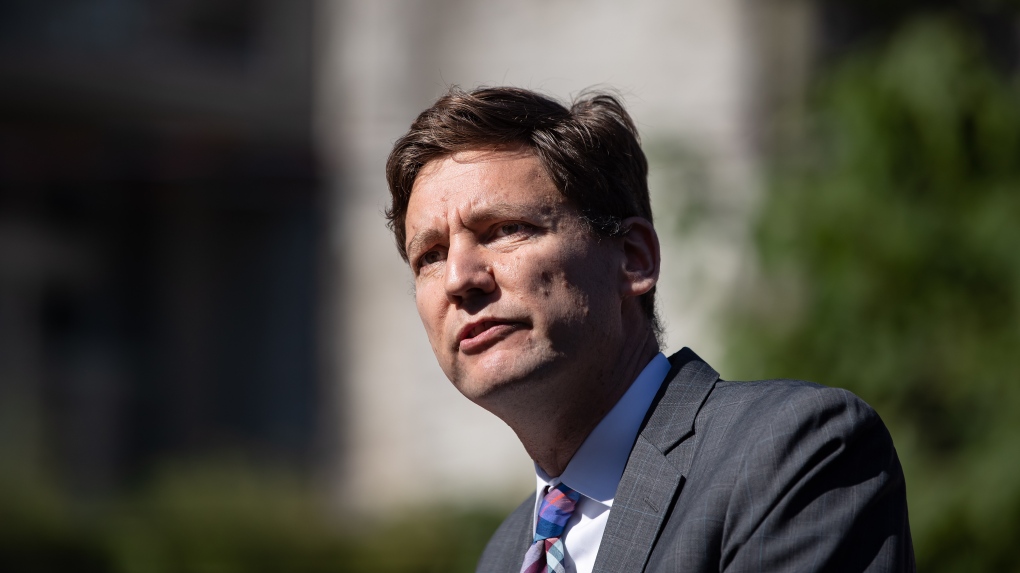David Eby announces affordable housing plan for British Columbia
British Columbia Premier David Eby announced new measures to increase the supply of new homes and lift rental restrictions on condominiums as the province grapples with a housing crisis affordable.
Eby, who was British Columbia’s housing minister before becoming premier, says his government’s new housing supply law, if passed, will identify municipalities most in need of more housing and set new housing goals for these communities.
The province says it has already identified eight to 10 communities where the new housing targets would be implemented based on census data, community plans and projected population growth.
The premier says the province will work with municipal governments to set benchmarks for housing, but ultimately it will be up to municipalities to decide how to achieve them.
Under the new legislation, if these community housing standards are not met, the province could issue directives and orders-in-council to compel communities to comply with the law as a last resort.
“I want to assure municipal leaders that I hold the province to the same standard,” Eby told reporters at the BC Legislative Assembly on Monday. “We need to do better on permits, we need to support cities, and we will.”
If passed, the housing supply law will go into effect in mid-2023, and the eight to 10 municipalities subject to housing targets will be notified after the law is enacted, depending on the province.
MODIFICATIONS TO THE LAW OF STRATA
The Prime Minister, alongside Victoria Mayor Marianne Alto, has also proposed changes to the province’s Strata Property Act that would ban most rental restrictions and age restrictions in condominiums.
The province says age-based restrictions, such as adult-only buildings, make it difficult for families to find housing and force people to move out if they have children.
The proposed changes would remove most age limits for strata buildings, but would still allow seniors-only strata to restrict occupancy to those aged 55 and over.
“Seniors need housing in our province and this rule makes sense for British Columbians,” Eby said.
The proposed changes would also prohibit blanket restrictions that prevent condominium owners from renting their units.
The province says 1.5 million people currently live in strata-managed buildings in British Columbia, with 300,000 units subject to rental restrictions.
“It is simply unacceptable that a British Columbian looking for a place to rent on Craigslist cannot find a house and someone who owns a condo is not allowed to rent that house to that person,” said the Prime Minister.
“It is equally unacceptable that a young couple who lives in a condo and decides to start a family has to start looking for a new home because this stratum has a rule that anyone living in the unit must be 19 years old. years or more.”
Under the amendments, strata would still be allowed to enact rules prohibiting short-term rentals through services like Airbnb.
The province is also seeking to amend the Strata Property Act to allow strata to hold meetings virtually on an ongoing basis in the future. Virtual meetings have been allowed during the COVID-19 pandemic, a temporary rule that is due to expire on December 31.
If passed, the amendments to the Strata Property Act will take effect immediately.
Omama Shoib, a healthcare worker who recently moved from Alberta to Victoria, called the proposed changes ‘a step in the right direction’, saying she almost turned down her new job as a harm reduction nurse in downtown Victoria when she couldn’t find a place to rent.
“It was a full-time job trying to find an option for myself,” Shoib said. “And it’s a job that I couldn’t do because I was packing my life in Alberta.”
Murray Rankin, attorney general of British Columbia and minister responsible for housing, said Monday that British Columbia has more renters per capita than anywhere else in Canada.
“With the population growth we are seeing in British Columbia, the demand for housing has never been higher,” added Eby.
“British Columbians should see this announcement as a continuation of our work on housing and they will see us accelerating our work on housing in the future.”
Nanaimo Mayor Leonard Krog says if his city is one of those chosen for provincial intervention, he’ll want to see the province provide positive incentives for housing construction, rather than taking a punitive approach with provincial ordinances.
“We’re the ones who have to take it around the neck, so to speak, upset neighbors,” Krog said.
“The premier won’t have many people criticizing provincial legislation when he comes to the grocery store in Nanaimo because he’s not in the grocery store, it’s me.”


Comments are closed.